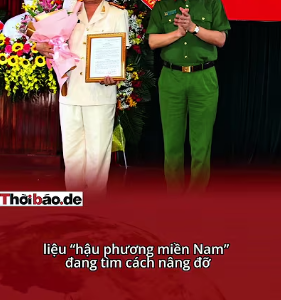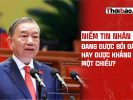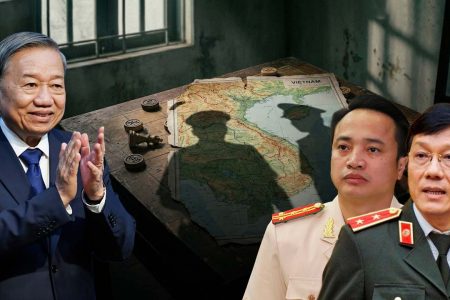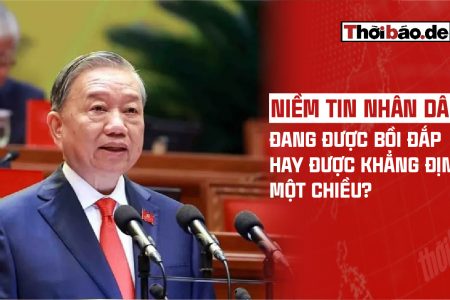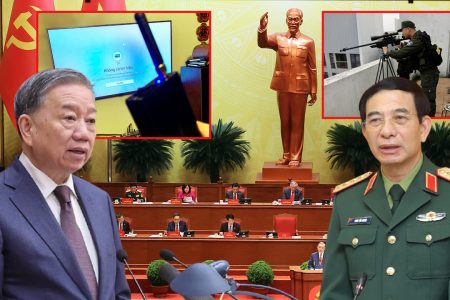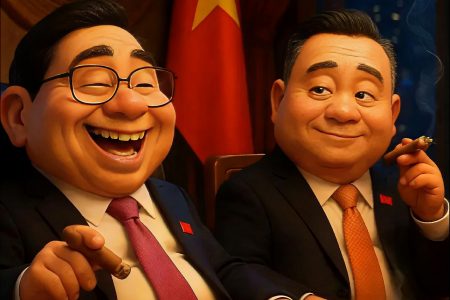
More than 3 months after some defendants in the hearing trying land petitioners in Dong Tam commune were released, these people said that until now, they are still haunted, panicked, sleepless because of what they experienced during the pre-trial detention.
Ms. Le Thi Oanh, a resident of Dong Tam, shared with Radio Free Asia on December 20.
“After the first-instance hearing, 14 land petitioners were released and came home. When they came back they said they cannot talk. People came to pick them up at the village’s headboard the night after the trial, everyone said they were not beaten and had no problem.”
But Ms. Oanh said it was only a while after the people were released that these people dared to reveal the truth, that they were forced to sign and pledged not to talk about what happened during their detention. Mrs. Oanh reported a case she witnessed; however, for security reasons, it is not possible to be identified:
“The first time I met him, he kept sitting with his hands and feet shaking. It means he is scared. I just asked why he sat and talked but kept shaking like that, he shared that he was scared, he could not sleep. While sleeping, he is dreaming about what has happened. In general, people’s mental affection is huge. When I see people like that, I feel very sorry.“

The Dong Tam case started when a functional force with thousands of armed policemen attacked the residential area of Hoanh village, Dong Tam commune, My Duc district, Hanoi, at dawn on January 9, 2020. Police said three police officers had been killed in this raid, and on the side of the local land petitioners, 84-year-old Le Dinh Kinh was shot to death unknowingly.
After that, 29 people were arrested, most of whom were relatives of Mr. Kinh’s family. At the first-instance hearing that began on September 9, which lasted for 7 days, the Hanoi People’s Court sentenced two of Kinh’s children, Mr. Le Dinh Cong and Le Dinh Chuc to death and his grandchild Mr. Le Dinh Doanh to life imprisonment.
Phil Robertson, deputy director of the Asia Division of Human Rights Watch, told the latest Radio Free Asia, that the Dong Tam case represents two particularly dark areas in Government policy in Vietnam: land management and a judiciary lacking all fairgrounds.
“What the Dong Tam case shows is that the government will not accept any challenge to their jurisdiction,” he said. This case, related to land rights, is a particularly sensitive issue.
Another thing that is reflected in the Dong Tam case is the complete and absolute control of the Communist Party of Vietnam over the court.”
The conflict between villagers in Dong Tam commune and the government has persisted for many years, through a dispute related to an agricultural area in the Senh field in Dong Tam commune. The Hanoi government considered it a defense land belonging to the Vietnamese army and its economic group Viettel. Mr. Robertson said the strong resistance of Dong Tam people forced Hanoi to „take action“:
“We are not surprised that the government finally suppresses them. This is almost a situation where the government cannot allow the open challenge to continue because otherwise, the government will lose credibility in its ability to control the population. That is a constant fear of the Vietnamese government.“
Lawyer Dang Dinh Manh, one of the lawyers invited by the defendants’ families to defend in the case, also noted that the land dispute issue in Vietnam will continue for a long time if there is no legal change and land ownership. He said:
“Dong Tam is related to the issue of land use in the relationship between the government and the people. Here the government knows very well that in land-use relations it is one of the most important points. It affects a lot of other things.”
Article 4 of the 2013 Land Law states: „Land belongs to the entire people, and is managed by the State as the owner and uniformly managed.“
Under this regulation, the state only grants land-use rights to the people. Lawyer Manh said that in cases where the state acquires land for public or defense projects, the interests of the people are ignored.
“It causes great frustration in society and if we pay attention, we see cases of injustice from the province bringing complaints to Hanoi, I can say that in 10 cases, 9 cases related to the whole land issue. I think the government already knows this, but for a better change, I think it must be a while.”
However, it is necessary to clearly distinguish between the Dong Tam case and the ownership of the disputed land. In the Dong Tam report, by journalist Pham Doan Trang and activist Will Nguyen, the two authors emphasized, “The issue of land disputes in the Senh field (Dong Tam commune) and the attack of the police entering the residential area of Hoanh village in Dong Tam commune are two cases with different legal nature, although they are related to each other but must be considered independently in terms of legal terms.” In the report, they continued, “Even when the state wants to grab the land, the case must follow the order and legal procedures. Is land coercion at midnight in the morning a logical sequence or not? Is this method of coercion closer to a state administrative operation or closer to an enemy raid?“
The coming January 9 will mark a year of the Dong Tam incident. Five people in the case who filed an appeal are Mr. Le Dinh Cong and Mr. Le Dinh Chuc, two people sentenced to death, Mr. Le Dinh Doanh (a life sentence), Mr. Bui Viet Hieu (16 years in prison), and Mr. Nguyen Quoc Tien (13 years in prison). The appeal hearing has not been scheduled by the Hanoi People’s Court, but according to the lawyer, it is probably set at the time to avoid affecting the 13th Congress of the Communist Party of Vietnam.
Many domestic and foreign lawyers and observers assessed that the first-instance hearing had many procedural errors. Dozens of international human rights organizations, representatives of Western countries have also spoken out about the so-called „pocket“ trial. Experts also do not seem very objective with the upcoming appeal hearing in particular and the judiciary of Vietnam in general.
Lawyer Manh said: “During new year’s time, we usually have the mentality of waiting for better things, better developments for the country, and especially in judicial activities. Hopefully, just hope, but the basis for a breakthrough change so far I have not seen it fully exposed.”
According to Phil Robertson from HRW, appeal hearings often do not change the judgment of first-instance trials, especially in political cases, unless the defendant cooperates or is particularly helpful to the regime.
Mr. Le Dinh Cong, who was sentenced to death, on December 15 sent a message to his defense lawyer saying that he „will not plead guilty even if he dies and (he) will not allow (investigating officer) to compromise unjustly.“ whatever „.
Mr. Robertson affirmed that the entire judiciary of Vietnam is a black mark for a government that wants to integrate into the civilized world:
“The entire Vietnamese legal system does not allow lawyers to meet clients until the police investigation ends, which is a problematic situation. A free and fair trial in Vietnam has many serious problems, especially with respect to all kinds of political cases. This is a black mark on the judicial system and prestige of Vietnam in the international arena when Vietnam is famous as a country that is completely controlled by the ruling party.”
Even in the country, Ms. Le Thi Oanh, a resident of Dong Tam, shared that the people no longer believed in the government.
“Before January 9, Mr. Kinh himself, as well as the people of Dong Tam, had absolutely no dissent against the government… Not at all. But when this happened, the people’s despair was considered to be lost. They did the same in the first instance trial. The more wicked they are, the more people’s hearts are indignant. People cannot do anything, but they are disobedient.”
As for Lawyer Manh, it is enough that 4 people died in the Dong Tam case:
„Maybe we don’t need more death sentences to kill more people.“
If the regime thinks they are guilty, he said, send them a lighter sentence instead of a death sentence.
Thoibao.de (Translated)





